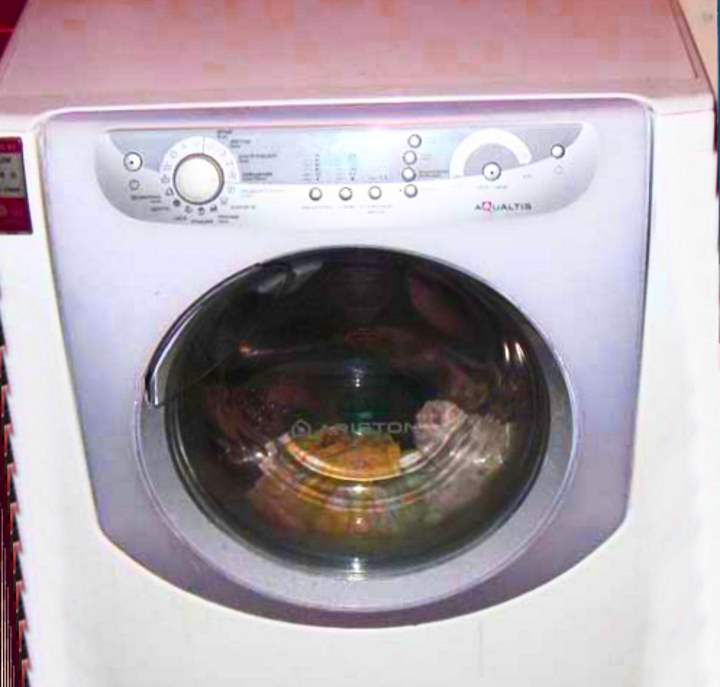 There are a huge number of washing machine models on the modern market of home appliances. They all differ in power, control, volume, color, etc.
There are a huge number of washing machine models on the modern market of home appliances. They all differ in power, control, volume, color, etc.
But each of them can be attributed to one of the two available categories: activator or drum.
Of course, drum models are much more numerous and their popularity is enviable, because they are more economical and gentle. But the disadvantage of them is that they are capricious and fail more often.
What are the likely breakdowns?
Common breakdowns include:
- water leakage from under the bottom;
- "freezing" of the machine;
- Strong noise and vibration;
- water intake without draining;
- the washing machine draws water, but does not wash.
Let us dwell on the last point.
The machine draws water, but does not wash.
The machine is on, the laundry is loaded, the washing program is started and even water has been drawn, but there is a problem... that is the end of washing and the machine does not wash. It is like it is frozen! The drum does not spin, the machine does not respond to anything.
What happened? What could have happened:
- Complete stoppage of the drum.
- Failure of the Heating element.
- The motor broke down.
- Broken bearings..
- Belt does not turn..
- Control module defective.
Let's consider each cause in detail.
Drum blockage
This is a mechanical failure and if you remove the interfering object, the problem will be solved.
Heating element failure
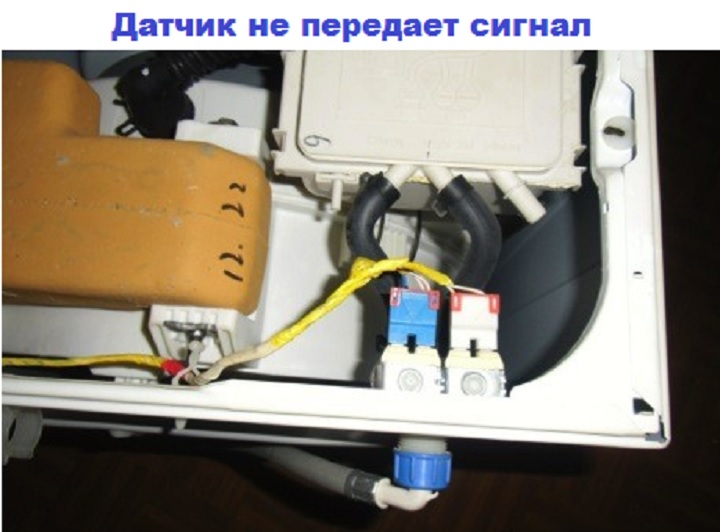 It's probably strange, but yes, problems with the heating element affect the performance of the drum and there is a situation when the machine draws water, but does not wash.
It's probably strange, but yes, problems with the heating element affect the performance of the drum and there is a situation when the machine draws water, but does not wash.
The motor does not get a command from the sensor to start. In turn, the sensor can not fix the desired temperature of heating.
It turns out that the motor can not turn on, and the drum, respectively, too. To check and inspect the heating element, it is necessary to remove the back cover of the machine or the front cover, depending on the model.
The heating element is located at the bottom of the tank. To get it out, remove the wires and unscrew the nut in the middle of the heater. If you can see black spots on it, it is most likely punctured and needs to be replaced.
If there are no visible malfunctions, a tester diagnostic will be needed. If it is good, the resistance should be from 20 to 40 ohms, otherwise less than 20. Reinstall the heating element carefully.
Faulty washing machine motor
More often than not, you have to replace only the brushes in the motor, not the whole part. To change the brushes will have to remove the motor, and with it all the sensors and the belt. Armed with a screwdriver, remove the terminal on the brush. To remove the brush, a plate is inserted into the hole, unbent and pulled out.
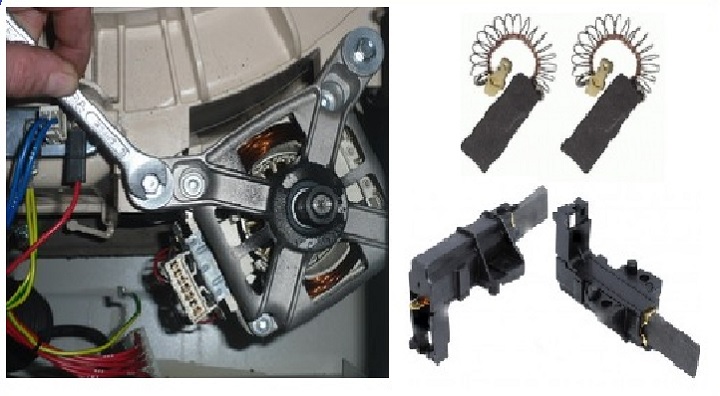 The same steps will help get the other brush out. Insert the new brush into the brush holder, press down on the spring and secure. That's it. Unless, of course, we are talking about asynchronous motor, where the brushes are not provided.
The same steps will help get the other brush out. Insert the new brush into the brush holder, press down on the spring and secure. That's it. Unless, of course, we are talking about asynchronous motor, where the brushes are not provided.
At such motors mainly the starting capacitance of the capacitor is lost and it does not have enough current to start, of course it is not possible to speak about revolutions.
In this case the capacitor can be replaced. Less often you have to do a rewind because the motor burns out. There are situations when the motor cannot start because of overheating, and then the machine pours water and does not wash. Usually the cause is the start of several consecutive washes.
Bearing failure
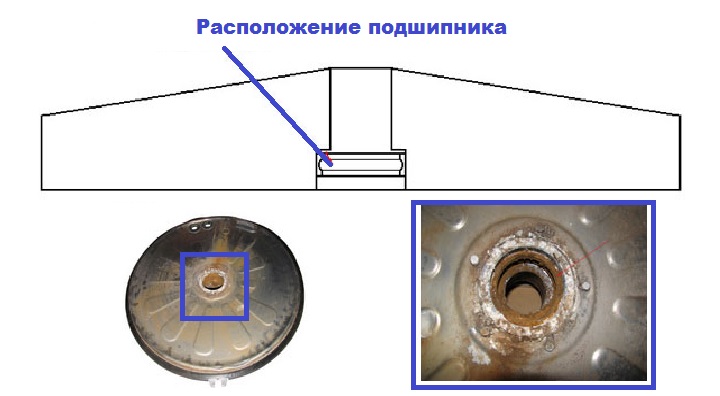 To the bearings are difficult to get toThey are located in the center of the tank of the washing machine. Thanks to them, the drum rotates.
To the bearings are difficult to get toThey are located in the center of the tank of the washing machine. Thanks to them, the drum rotates.
If the bearings have collapsed, the machine will notify you with a clear creak and noise during operation, and also will knock.
Untimely replacement threatens a more serious repair, because a broken bearing is able to break the belt and damage the drum.
The drive belt does not work
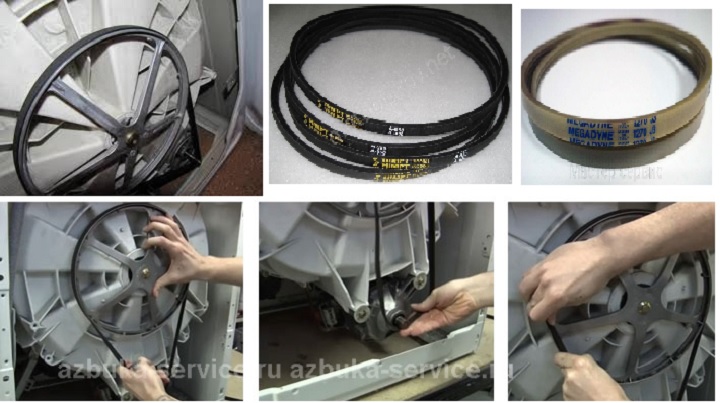 Washing machine fills the water but does not wash. - Diagnosis can safely begin with the belt, unless of course the machine is direct drive.
Washing machine fills the water but does not wash. - Diagnosis can safely begin with the belt, unless of course the machine is direct drive.
A common cause of belt problems is regularly overloading the machine with laundry. Constant stress on the drum axle loosens it and wears out the belt, which can deform or even tear the part.
It happens that the belt comes off when transporting the machine. You will have to disassemble the washing machine and check the suspicions. The belt is installed behind the back cover in front-loading, in vertical loading - behind the side. If the belt is fine and just fell off the pulley - it is not a problem. Otherwise, a torn belt will need to be replaced with a new belt.
Putting it on or replacing it will require simple steps. Take it out of the car and check for defects. To put it on, first put it on the engine, then pull it up with one hand and put it on the pulley with the other. To fix the belt, twist the pulley counterclockwise and put the belt on it.
Control module malfunction
You will need to diagnose and test the module on a special bench, because it is difficult to determine by eye what is burned on the board, if there are no black traces on the parts and tracks. Even if there is, you will need a professional board soldering. The work is painstaking. Without experience and skill the chances of buying a new board and replacing it with an old one are high.
How to determine the problem yourself
There are simple and uncomplicated things you can identify and try to fix yourself. You can do it yourself:
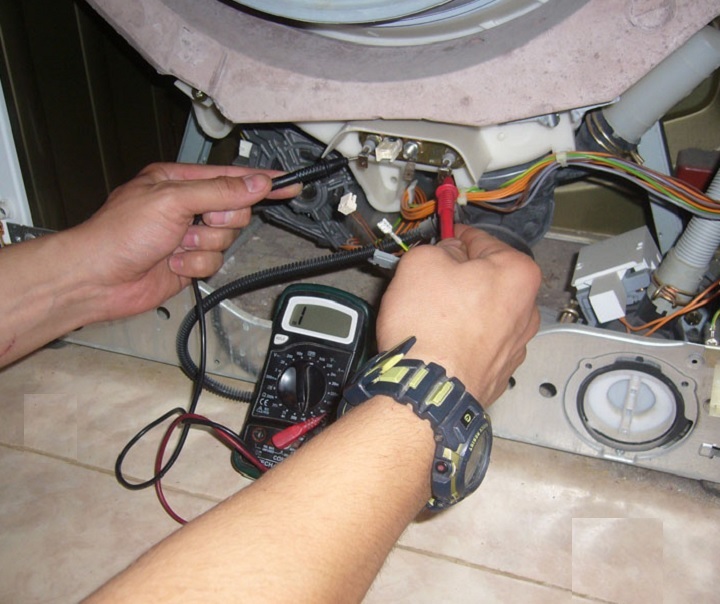 If you have a tester, you can check the heating element (heater) and the motor. If visually noticeable strong sparking, you will need brush replacement. When buying them, you need to consider the type of motor of your washing machine.
If you have a tester, you can check the heating element (heater) and the motor. If visually noticeable strong sparking, you will need brush replacement. When buying them, you need to consider the type of motor of your washing machine.- Emergency drain water from the machine with a special valve or hose if the washing machine poured water, but does not wash.
- Visually inspect the tank and drum for foreign objects stuck between the parts. To do this, you will have to remove the sides of the washing machine. If an obstacle is found, it must simply be removed.
- On your own, you can check the drive belt. If it just came off, you need to put it in place so that there is a margin of 1 tooth. And if it's torn, you need to replace the part with a new one.
If you do not know what happened to the machine, for what reason it does not work, it will be wise to contact the service.
To prevent breakdowns of this kind, all you need to do is:
- Do not overload the drum with laundry,
- install over-current protection,
- to use the filter, because many people know in what water it is better to wash and what consequences may result from neglecting this fact.





Hello!
Please tell me what the problem is with the machine indesit wil85.
The machine in the modes of spin, drain, rinse works, but when you turn on the washing mode complete silence. No error messages. If you can reply to the post.
Regards, Alexander.